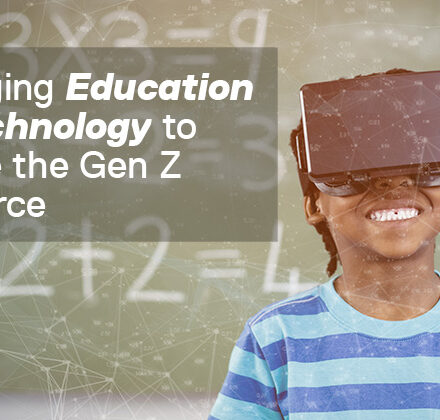Gen Z – those born between the mid-1990s and early 2000s – could potentially account for more than 20% of the workforce by 2020. To better understand the first digital-native generation and how they will reshape the workplace, Dell Technologies commissioned a study, Gen Z: The future has arrived, involving 12,000 high school and college students (ages 16-23) from around the globe to get their views on technology and the future of work.

Technical Consciousness
As Gen Z enters the global workforce, technical consciousness stands clearly as their most salient characteristic. Aptly labeled “digital natives,” Gen Z’ers have lived their entire lives in the presence of digital technology, i.e. smart phones, laptops, tablets, home technology systems, and social media. Consequently, they are innately conscious of the presence, use, and ubiquity of technology.
Chief Learning Officer reports that “[Gen Z] are not only technically savvy, but also expect technology to be a natural—and frequent—part of their learning and work.”
Overwhelming majorities of respondents to the global survey affirmed Gen Z individuals value technology and its impact in these ways:
- Technology literacy matters (97%)
- Experienced technology as a platform in their formal education (98%)
- Technology offered by an employer a factor in taking the job (91%)
- Technology and automation will make work environments more equitable (80%)
The global survey also found that:
- Gen Z wants to work with cutting-edge technology
- Great technology will entice Gen Z job candidates
- Gen Z cares about data security, but is unsure how to address it

These digital native values are meaningful factors in preparing for, accepting, and realizing the value of these newcomers to the workforce, and accordingly, organizations should demonstrate a “tech-first” approach in several ways:
- Technology in operational processes: hiring, orientation, daily work
- Technology in Informational and educational processes: on-line, on demand, mobile, and blended
- Technology relevant to developmental efforts: removing gaps by encouraging STEM careers for women, for example
Job Skill Concerns
Survey respondents indicated a fairly high level of confidence in their technology literacy and competence, +/- 75%. However, their certainty of non-technical skills and of readiness for initial work experiences is not so strong.
Deloitte confers in their 2017 Insights report, Gen Z enters the workforce:
Technology has impacted the development of cognitive skills, including intellectual curiosity, among the next generation, creating the risk of skill gaps when they enter the workforce en masse. A shortfall in highly cognitive social skills such as problem solving, critical thinking, and communication, could be particularly evident. Most of Gen Z too acknowledges the importance of in-person communication and its own deficiencies in this area.
High numbers desire significant levels of human connection and communication on the job. In several ways this human connection is identified:
- Preference for in-person communication over telephone, even greater over texting and messaging
- Desire to learn from co-workers on the job
- Willingness to tutor co-workers in technology literacy
- Choice of workplace over work-at-home and choice of team over independent work
The implications drawn from these preferences are several, all of which involve interpersonal opportunities for Gen Z :
- Technology mentorships that may cross generational, experiential, and/or functional borders
- Internships, rotation programs that expose Gen Z to opportunities to learn from others
- Leadership and stretch assignments to build Gen Z confidence in non-tech skills
Learning Resources

Technology plays a significant role in the formal educational experience of Gen Z. Interestingly, they see social media as both an appropriate learning platform and as a valuable tool in the workplace. An almost equal percentage prefer to learn on the job, from co-workers or others, than online.
This seems to indicate their familiarity with technology as the method of conveying information, familiarity that leads to comfort. It may also indicate their realization that the educational content from someone with actual experience is greater than e-learning.
Another interesting set of findings are the types of ways in which Gen Z desire to work with technology. There is relatively even division across the technology range, from R&D to developing apps for non-tech purposes:
- Developing technology (R&D) (46%)
- Use technology to help others or environment (40%)
- Ensure appropriate use of technology (cybersecurity) (39%)
- Implement technology for others to use (IT) (38%)
- Apply apps and devices to do work that is not traditional tech work (37%)
This logically impacts what types of learning they will need to enhance their work. Their familiarity with technology and their desire to learn from people on the job co-equally affect how the L&D may be provided. Gen Z has been as one with immediate access to information. While they may have greater confidence in learning non-tech skills from those people with whom they work (including their boss), they will not give up relying on almost instant instructional videos and mini-lessons.

Shift eLearning reports in 2018: “While [Gen Z] may need less training on technology, they may require more in offline interpersonal communication….[and]You need to create bite-sized learning modules to keep Gen Z-ers attention.”
Implications that we derive from this array of responses and conclusions suggest these focuses:
- Attention the quality and viability of online content as current, accurate, and complete
- Application of design thinking to L&D: learner interviews, empathic design, rapid prototyping, testing and revising
- Provision of methodologies appropriate to content and learning expectations: on-the-job opportunities, online and on demand, partnership/stewardship, for example
- Combination of attention to Gen Z value of technology and people-connection
Summary
Delivered in the preferred modality for a Gen Z audience – i.e. predominantly online, on-demand, mobile and blended – L&D organizations with a broad portfolio of Associate-, Specialist-, and Expert-level training and certification in these cutting-edge technologies will be well-positioned to prepare the Gen Z workforce entering today’s transforming IT environments.
Sources
Carolyn O’Boyle, Josefin Atack, Dr. Kelly Monahan: Generation Z enters the workforce (Deloitte Insights, 2017)
Further Reading:
Click Here to See What Gen Zers Are Saying
Dell Technologies Gen Z Research Reveals Good News: We Haven’t Raised a Generation of Robots


